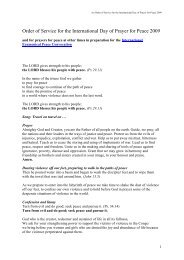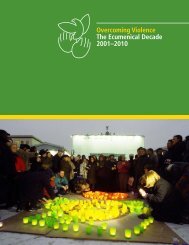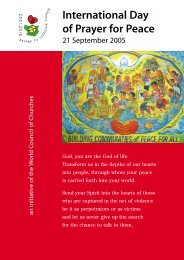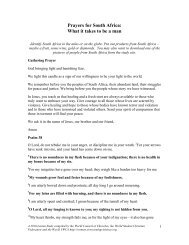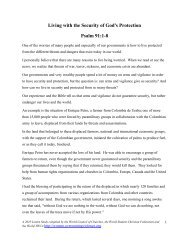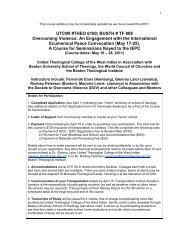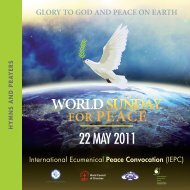Alternative Globalization Addressing Peoples and Earth
Alternative Globalization Addressing Peoples and Earth
Alternative Globalization Addressing Peoples and Earth
Create successful ePaper yourself
Turn your PDF publications into a flip-book with our unique Google optimized e-Paper software.
47<br />
“How do we live our faith in the context of globalization?” Harare<br />
recommended (Together On the Way, WCC 1999:183) that the challenge<br />
of globalization should be a central emphasis of WCC work, building<br />
upon many significant efforts in the past.<br />
“The vision behind globalization includes a competing vision to the<br />
Christian commitment to the oikoumene, the unity of humankind <strong>and</strong><br />
the whole inhabited earth,” the assembly said, <strong>and</strong> recommended that<br />
“the logic of globalization needs to be challenged by an alternative way<br />
of life of community in diversity. Christians <strong>and</strong> churches should reflect<br />
on the challenge of globalization from a faith perspective <strong>and</strong> therefore<br />
resist the unilateral domination of economic <strong>and</strong> cultural<br />
globalization.” 18<br />
At its 23 rd general council in 1997, the World Alliance of Reformed<br />
Churches called for a commitment process that included recognition,<br />
education <strong>and</strong> confession regarding economic injustice <strong>and</strong> ecological<br />
destruction. The WCC assembly acknowledged this call <strong>and</strong> encouraged<br />
its own member churches to follow this process. It was also emphasized<br />
that work on globalization should build upon <strong>and</strong> strengthen existing<br />
initiatives by churches, ecumenical groups <strong>and</strong> social movements, support<br />
their cooperation, encourage them to take action, <strong>and</strong> form alliances with<br />
other partners in civil society working on issues pertinent to globalization.<br />
One of the challenges formulated was the need for a critique, for alternative<br />
responses to transnational corporate activity, to the Organization for<br />
Economic Cooperation <strong>and</strong> Development, the International Monetary<br />
Fund, the World Bank, the World Trade Organization, the International<br />
Labour Organization etc. <strong>and</strong> the multilateral agreements they generate.<br />
The churches were asked to identify the harmful as well as the positive<br />
impact of the policies of these organizations.<br />
The January 2001 Potsdam, WCC Central Committee’s policy on<br />
economic globalization<br />
The central committee of the WCC meeting in Germany in January 2001<br />
approved a policy on economic globalization that directed the WCC to<br />
focus on searching for alternatives to economic globalization based on<br />
Christian values in the following three areas:<br />
• the transformation of the current global market economy to embrace<br />
equity <strong>and</strong> values that reflect the teachings <strong>and</strong> example of Christ;<br />
• development of just trade;<br />
18<br />
See Together on the way, the WCC assembly report, WCC 1999 pp. 183-184 <strong>and</strong> the<br />
January, 2001, central committee minutes.




